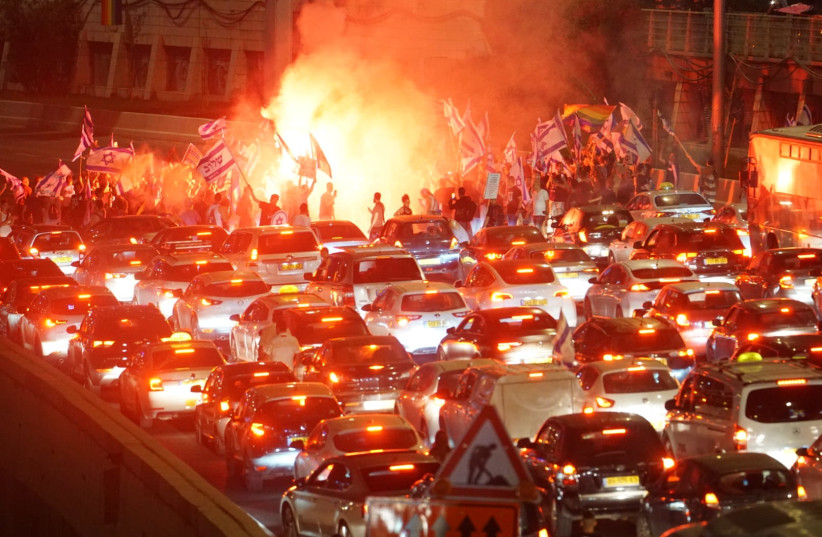‘Day of Resistance’ scheduled for Tuesday if controversial bill advances
The intensity of protests against the government’s judicial overhaul plans increased Saturday night as massive crowds gathered to voice their opposition ahead of the government’s scheduled vote late Monday night on the first reading of one of the bills associated with the reforms.
Protest leaders have vowed to boost the demonstrations to “unprecedented” levels this Tuesday if the first reading of the bill is indeed passed.
Beginning at 8 a.m. on Tuesday, protesters will hold “demonstrations, marches, convoys and disruptions throughout the country,” the protest groups said in a statement on Saturday. Later on, a mass protest will begin outside of Ben-Gurion Airport, and additional demonstrations and marches will continue during the evening in what the protest leaders said would be “July’s first Day of Resistance.”
“The people of Israel do not want a dictatorship, and do not want one-sided dictatorial and dangerous legislation that will crash the economy, harm security and tear apart the people,” the protest leaders said in the statement. They called on Prime Minister Benjamin Netanyahu and his “extremist” partners in the government to stop the bill and not pass its first reading on Monday.
“If the government does not stop, the entire country will stop,” they warned.
 PROTESTERS CLASH with police during Monday’s protest against the government’s planned judicial overhaul, at Ben-Gurion Airport. (credit: AVSHALOM SASSONI/FLASH90)
PROTESTERS CLASH with police during Monday’s protest against the government’s planned judicial overhaul, at Ben-Gurion Airport. (credit: AVSHALOM SASSONI/FLASH90)What is the law being discussed?
Former public security minister Omer Barlev spoke to protesters at the Science Park intersection in Rehovot.
“The disintegration of the state continues with the support of the government ministers and it is happening every day in Judea and Samaria, by those who are called the ‘Hilltop Youth,’” he said. “They are not the Hilltop Youth but a private militia of fascist anarchists who do not recognize the laws of the country. They are the golem that rose up against its creator, or in a more contemporary term – ‘the settler Wagner force.’”
“If on Monday the bill passes, we will stop the country from functioning,” said Sara Yitzchaki, one of the leaders of the student protest, who was demonstrating at the main protest on Tel Aviv’s Kaplan Street.
“We have exams tomorrow, and we’re here protesting,” she continues. “We’re not going anywhere.”
“I hope that we can convince the heads of academic institutions to go on strike if the law passes in parliament,” said Bar Yakula, head of the student protest. “We hope young people will join us.”
The bill in question is an amendment to Basic Law: The Judiciary, which would block Israel’s courts from applying what is known as the “Reasonableness Standard” to decisions made by elected officials. The standard is a common law doctrine that allows for judicial review against government administrative decisions that are deemed beyond the scope of what a responsible and reasonable authority would undertake.
Proponents of the law argue that it is a highly subjective tool for judicial activism that allows the court to subvert government policy with its own views. Critics, including the attorney-general, argue that the tool is essential to counter corruption and to ensure the protection of individuals from arbitrary and capricious government decisions.
The court used the reasonableness standard, for example, when it ruled in January that Prime Minister Benjamin Netanyahu’s decision to appoint Shas chairman Arye Deri to two ministerial positions, despite three criminal convictions on white-collar crime committed while in power, suffered from “extreme unreasonableness.”
The Knesset Constitution, Law and Justice Committee led by MK Simcha Rothman (Religious Zionist Party) approved the bill on Tuesday for its first reading. Monday’s plenum begins at 4 p.m., and the opposition is likely to hold a filibuster throughout the night. The coalition, which has a 64-56 majority in the plenum, will therefore likely only hold the vote late Monday night or early Tuesday morning.
Once the bill passes its first reading, it will return to the Constitution Committee, where it will be prepared for its second and third readings. Once approved in the committee, it will return to the plenum for the second and third readings, after which it will become law.
In comparison, in March, a controversial bill to amend the Judicial Selection Committee such that the government would control the committee – and thus control the appointment of judges at all levels of Israel’s court system – stalled the day before the plenum was scheduled to vote on its final two readings and pass it into law.
Protests leaders called on Thursday and throughout the weekend for mass protests and on all of Israel’s citizens to take a vacation day on Tuesday if the reasonableness standard bill passes, to demonstrate, “legally but determinedly, in the streets, squares, and outside of government institutions.” The leaders also called on employers and senior figures in the economy to support workers who wish to demonstrate, and even shut down workplaces, since “if the legislation passes, Israel is on a clear path to become a zealous and extremist dictatorship.”
 ”Kaplan Force” blocking incoming traffic on Ayalon Highway during the 25th week of judicial reform protests June 24, 2023. (credit: LIOR SEGEV)
”Kaplan Force” blocking incoming traffic on Ayalon Highway during the 25th week of judicial reform protests June 24, 2023. (credit: LIOR SEGEV)On Sunday, the government is scheduled to hold a discussion concerning police operations during protests, as many ministers have criticized in recent weeks what they claimed was selective enforcement. Cabinet Secretary Yossi Fuchs requested in a letter to Attorney-General Gali Baharav-Miara last week that she prepare answers concerning the number of protesters arrested, and the policies concerning the blocking of roads, threats to public officials, and calls for civil disobedience.
Baharav-Miara warned the government in a letter on Thursday that holding such a discussion now raised “many difficulties.”
“Effectively, the government is asking to discuss concrete incidents linked to a protest against its policies. Moreover, some of the participants in the discussion have personal interests being currently handled by law enforcement,” Baharav-Miara wrote. The attorney-general added that she and the other representatives of the law enforcement system would present the guidelines for the handling of protests, but would not discuss – directly or indirectly – concrete incidents.
“Especially in times of protests against the policies of the government and its ministers, the government must be extra careful to avoid actions that could be interpreted as an attempt to illegitimately influence the professional considerations of law enforcement,” the attorney-general wrote.
Spontaneous protests break out
Spontaneous protests broke out on Wednesday night after outgoing Israel Police Tel Aviv District Chief, Superintendent Ami Eshed, accused the government of demanding that he apply more force against protesters in order to clear the Ayalon Highway, even if it meant “filling the Ichilov [Hospital] emergency room” with injured protesters.
Protests continued on Thursday night during what protesters called “The Night of the Collaborators” outside of the houses of over a dozen MKs. Similar protests were held on Friday and Saturday.
The weekend included another incident of violence against protesters, after a driver was seen ramming into protesters on Wednesday. The incident occurred in Omer, where a driver attempted to ram into demonstrators outside the home of Likud MK Shalom Danino. The driver and a passenger exited the car and assaulted the protesters, one of whom was injured. The police arrested both of the attackers.
Another noteworthy vote in the Knesset scheduled for Wednesday is a vote for the Knesset’s second representative on the Judicial Selection Committee. Opposition leaders MK Yair Lapid (Yesh Atid) and Benny Gantz (National Unity) announced last month that they would not continue talks at the President’s Residence until the committee is formed.
However, in a vote on June 14, Netanyahu attempted unsuccessfully to delay the election of both representatives by a month. In the anonymous vote, opposition MK Karin Elharrar (Yesh Atid) was elected to the committee with at least four votes from coalition members.
However, even if the Knesset elects its second representative on the committee, which will likely be Otzma Yehudit MK Yizhak Kroyzer, Levin has not yet announced who the second minister on the committee will be. The justice minister said last week that he believed the current makeup of the committee was “warped,” and he is unlikely to convene it in the near future – despite dozens of judicial vacancies waiting to be filled.
Michael Starr and Jerusalem Post Staff contributed to this report.





Comments are closed.